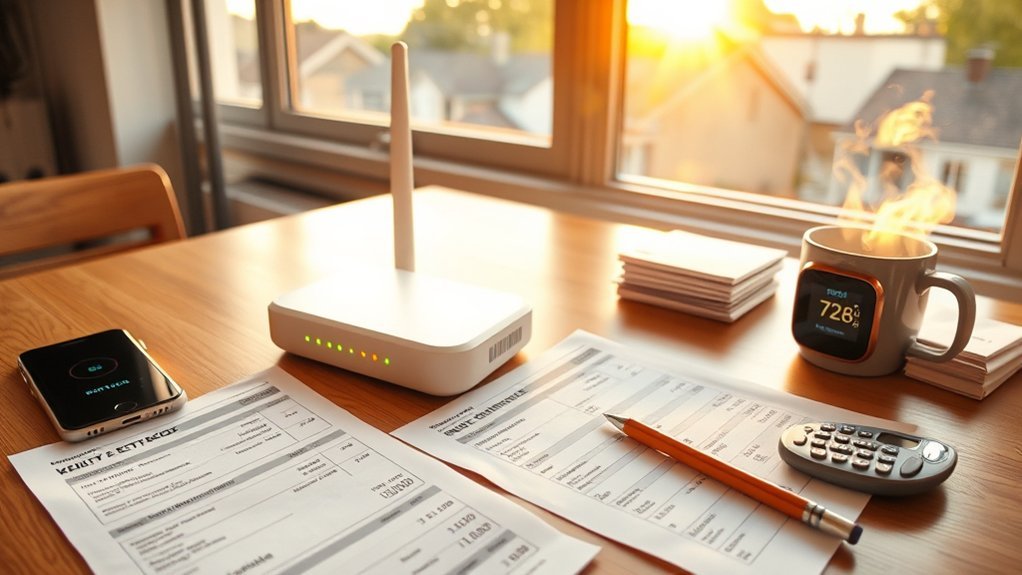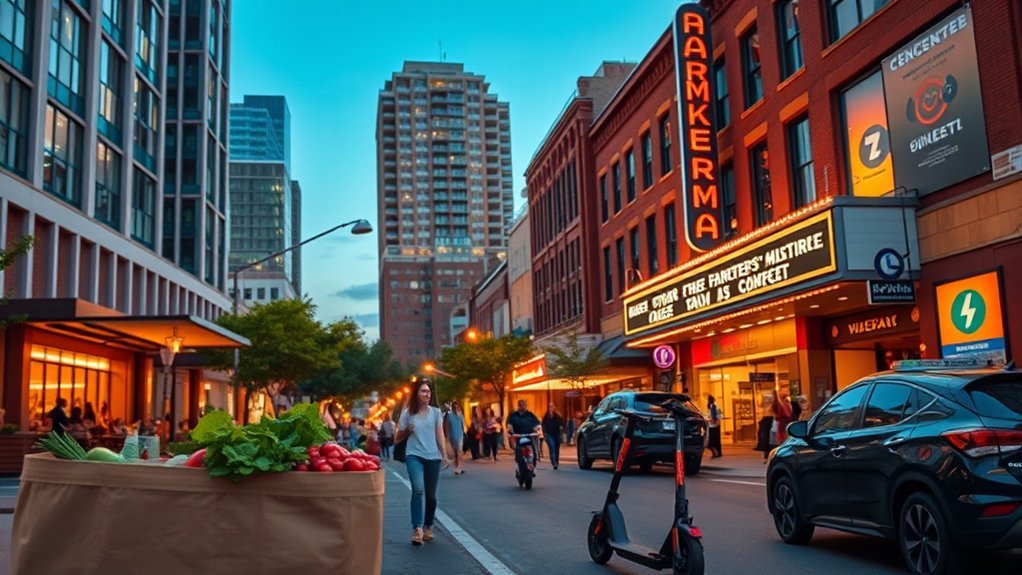Picture stepping into a light-filled Raleigh apartment and checking the numbers on your phone—rent, utilities, groceries—then wondering how it all fits. You’ll see housing usually drives most costs (rent around $1,369–$1,468; monthly homeowner outlay about $2,056), utilities near $176–$187, food around $694, and healthcare a bit higher than national averages. Keep going and you’ll get practical monthly budgets, tradeoffs, and tips to balance them.
Cost of Living Snapshot for Raleigh Residents

Although Raleigh’s overall costs sit about 3.2% below the U.S. average, your budget will depend heavily on housing and healthcare choices. You’ll find the cost of living tempered by a median household income near $82,424, which helps offset expenses but doesn’t eliminate trade-offs.
Although overall costs are about 3.2% below average, housing and healthcare choices will shape your budget in Raleigh.
If you rent, expect average monthly rent around $1,369–$1,468 and total renter expenses near $4,677 monthly; homeowners face higher outlays, with mortgage payments near $1,821 and average owner expenses about $8,077.
Utilities are a relative savings — energy runs roughly $176–$177 and phone about $189 per month, making utilities near 10% cheaper than national norms.
Healthcare is a notable upward pressure: overall medical costs are roughly 12–14% above average, with typical doctor visits around $146–$157 and dental visits near $154. Use these figures to model scenarios and prioritize where you can trim or must allocate more of your monthly budget. Additionally, it’s important to consider that building a house can often be more expensive than buying an existing home, which might influence your housing budget.
Housing Costs: Renting Vs Buying

When you weigh renting against buying in Raleigh, the numbers make the trade-offs clear: average monthly rent sits around $1,369–$1,468 (about 16% below the national average), while typical mortgage payments run near $1,821/month at recent rates, with median home values roughly $378K–$440K and listings commonly in the $461K–$467K range.
If you value flexibility or lower upfront costs, rent in Raleigh will usually cost less month-to-month than a mortgage, and composite renter budgets estimate housing near $2,061/month when fees and insurance are included.
If you plan to stay and build equity, a median home purchase may make sense despite higher monthly mortgage payments; homeowner budgets often show housing near $2,056/month once taxes and maintenance are factored. Additionally, understanding the cost of repairs for any home maintenance, including air conditioning systems, is vital when budgeting for homeownership.
Neighborhoods vary: new construction and suburbs push prices from low $300Ks to $700Ks, so compare monthly rent versus projected mortgage plus ownership expenses for the specific area you’re targeting.
Monthly Utilities and Telecommunications

Typically, your monthly utilities and telecom in Raleigh will run lower than the national average: energy (electricity and gas) averages about $176–$187 per month — roughly 10–14% cheaper — thanks to rates near $0.17/kWh and $1.09/therm, while phone bills average roughly $182–$190 per month (around 3% below the U.S. norm).
Expect energy bills to be the largest single line for renters; if you own, a homeowner utility picture often shows higher aggregated numbers because bundles include water, internet and other fees. Utility billing also adds modest city service charges — recycling ~$4.80 and garbage ~$13.70 monthly — plus a watershed protection fee that varies with consumption.
Typical packaged figures cite about $225/month for electricity-related charges in some reports and approximately $756/month when homeowners annualize and weight all utilities together. To budget, track kWh and therm usage, compare bundled internet/phone offers, and factor municipal fees so your monthly projections match actual homeowner utility outlays. Regular inspections can catch hose issues early, similar to how monitoring utility usage can help manage costs effectively.
Grocery Prices and Food Budget

You’ll find grocery prices in Raleigh sit almost exactly at the U.S. average, so budget planners can assume only minor local variation: a loaf of bread is about $4.09, a gallon of milk $4.58, a dozen eggs $3.33, ground beef roughly $7.00/lb, and steak around $15.51.
Expect groceries to range about 0.4% higher to roughly equal national figures depending on store and neighborhood. If you rent, plan roughly $694 monthly for food-at-home; that figure contributes to an average renter monthly expense near $4,677. Grocery line items such as cheese (~$4.30) and potatoes (~$4.98) show modest product-level differences rather than broad market shifts.
When you evaluate Raleigh’s cost of living index, groceries are a meaningful component but not the primary driver—housing and healthcare weigh more. To control spending, shop sales, use neighborhood discount stores, and buy in-season produce; small adjustments will keep your grocery budget aligned with the city’s average. Additionally, being mindful of regular software updates can help prevent unexpected expenses in other areas like technology, which can impact your overall budget.
Healthcare and Personal Care Expenses

After planning groceries, you should factor healthcare and personal care into your monthly budget: doctor visits average about $146.67, dental appointments run near $153.61, and optometrist exams cost roughly $109.33.
Raleigh’s healthcare costs run about 12–14% above the U.S. average, so expect slightly higher out‑of‑pocket spending even with insurance. You’ll also pay for OTC meds and routine grooming, which add up.
- Doctor visit: $146.67 average — budget for co‑pays or higher specialist fees.
- Dental: $153.61 average — include cleanings and occasional procedures.
- Optometrist: $109.33 average — factor exams and new glasses.
- Personal care & OTC: haircuts ~$28.10, salon ~$55.17, ibuprofen ~$11.26.
Use these line items to model monthly and annual healthcare allocations alongside rent and home prices; if you’re comparing neighborhoods, higher home prices often correlate with access to premium providers, which can raise your healthcare spend. Additionally, budgeting for legal fees, such as those associated with probate lawyer costs, can help ensure you are financially prepared for any estate matters that may arise.
Transportation: Public Transit and Driving Costs

While Raleigh’s public transit can handle many routine trips, you’ll want to weigh transit fares against driving costs: a GoRaleigh single ride is $1.25 (reduced $0.60) with free rides for ages 13–18, seniors 65+ and kids 12 and under, and monthly passes (around $40) lower per-trip expenses for regular riders.
While GoRaleigh covers many routine trips, weigh $1.25 fares versus ~$40 monthly passes and driving costs.
If you commute several days a week, a monthly pass cuts your per-ride cost and removes parking hassle. Public transportation coverage is decent for core corridors but may force longer trips or transfers if you live farther out.
Driving gives flexibility; gas prices in Raleigh average about $3.14/gal, which keeps fuel costs modest versus many metros. Factor in car insurance — roughly $2,047 annually (~$171/month) — plus maintenance and parking.
Combined commuting costs in Raleigh run below the national average (about 8% lower), so compare your route, frequency, and total monthly pass versus fuel, insurance, and upkeep before choosing. Additionally, understanding the lawyer’s fee structure can be crucial if you find yourself needing legal assistance related to driving violations.
Goods, Services, and Entertainment Prices

You’ll find entertainment and leisure in Raleigh a bit pricier than average — movie tickets run about $14.21, roughly 14% above the national comparison.
Personal care and services mirror that pattern (haircuts ~$28.10, beauty salon visits ~$55.17, dry cleaning ~$20.05, gym/yoga ~$22.40), while clothing costs are typical for a mid-size city (men’s shirt ~$32.17, women’s slacks ~$33.67).
Add media and miscellaneous household items (newspapers ~$11.39) to reach a Goods & Services monthly component near $2,677 for homeowners, about +0.2% vs. the U.S. average. Additionally, consider that costs for services like retainer replacement can significantly impact your overall budget.
Entertainment and Leisure Costs
Frequently, you’ll find that entertainment and personal care in Raleigh run just above national norms: a movie ticket averages about $14.21–$14.26 (roughly 14% higher than the U.S. average), haircuts cost around $28.10, beauty salon services about $55.17, yoga or gym sessions average $22.40, and dry cleaning is roughly $19.97–$20.05 per item, leaving typical goods and services (clothing, entertainment, personal care) about 0.2–0.4% higher than the national level.
You can plan your monthly budget around these prices. Typical entertainment and leisure expenses might look like:
- Monthly streaming + occasional movie: $30–$60.
- Weekly gym/yoga (membership or drop-ins): $60–$100.
- Two haircuts and basic grooming: $50–$70.
- Dry cleaning and occasional clothing purchases: $40–$80.
These figures help you gauge realistic entertainment and goods and services costs.
Personal Care and Services
Often you’ll find that basic personal care and everyday services in Raleigh run slightly above national averages, so budgeting with local prices keeps your estimates realistic.
You’ll pay about $28.10 for a haircut and $55.17 for a beauty salon visit, so personal care appointments add up if you go monthly.
Over-the-counter meds like ibuprofen average $11.26.
Routine healthcare services — optometrist $109.33, doctor $146.67, dentist $153.61 — are important when you forecast annual care costs.
Leisure errands factor in too: movie tickets $14.21, dry cleaning $20.05, yoga classes $22.40, newspaper $11.39.
If you’re a single adult, you need to budget these basic services and occasional medical visits into your monthly plan.
Clothing, Media, and Miscellaneous
While clothing and everyday leisure items in Raleigh sit only marginally above national norms, you’ll want to budget for slightly higher costs in several categories: a movie ticket averages $14.21 (about 14% above the cited national $12.52), basic haircuts run $28.10 with salon services near $55.17, dry cleaning is roughly $20 per item, and common apparel — men’s shirts $32.17 and women’s slacks $33.67 — reflects goods and services about 0.4% higher than the U.S. average.
You should factor these into monthly spending alongside media and miscellaneous charges. Typical miscellaneous items like a yoga class or gym session average $22.40 and a newspaper costs $11.39.
Practical examples:
- Movie ticket: $14.21
- Haircut/salon: $28.10 / $55.17
- Dry cleaning per item: ~$20
- Yoga/gym or newspaper: $22.40 / $11.39
Income, Wages, and How Much You Need to Live Comfortably

Raleigh’s income picture lets you stretch your dollars further than in many U.S. metros: the city’s median household income is about $82,424 and median personal income is $49,948 (above the national personal median of $43,289), and average hourly pay sits near $31.84.
That median income and average hourly wage reflect a competitive market driven by the Research Triangle, so you’ll often find wages keeping pace with costs. To live comfortably after taxes, plan on roughly $43,000 annually for a single adult and about $58,000 for two adults (no kids), per MIT’s Living Wage Calculator.
Those targets assume typical local expenses; healthcare costs run ~12–13% above the national average, which bumps your budget. Additionally, being aware of your legal representation costs can help you manage your overall financial planning.
With overall cost of living about 2–4% below the U.S. average, your actual need to live comfortably will hinge on housing choice (rent vs. buy) and household size. Use these benchmarks to set salary goals and evaluate offers against your expected monthly expenses.
Moving, Saving, and Local Resources for New Residents

When you’re planning a move to Raleigh, start by timing and packing strategically to cut labor hours and truck rental days—weekdays and mid-month moves are usually cheaper.
Expect moving costs to include truck or mover fees, insurance, and supplies, and compare those against potential savings from transit options (GoRaleigh monthly passes ≈ $40) and lower-than-average utility bills (~10% below U.S. average).
Use local resources like RaleighRealty, GoRaleigh maps, and neighborhood cost guides to model trade-offs between suburbs (Apex, Fuquay‑Varina, Holly Springs) and estimate net monthly impact on your ~$4,677 renter budget. Additionally, consider the long-term savings from not having to pay for a gym membership when you set up a home gym in your new space.
Packing and Timing
Because moving costs add up fast, aim to save at least one month’s rent (Raleigh averages about $1,369–$1,468) plus another month for the security deposit and a small emergency cushion, and plan your timing and packing around that budget.
You’ll want to Time your move for late spring or early summer when inventory rises, but expect slightly higher rents.
Pack essentials for the first week and schedule utilities and phone activation before arrival.
- Calculate savings: save at least one month’s rent + deposit + 2–3 weeks buffer for closing or delays.
- Pack list: toiletries, basic cookware, chargers, one set of bedding, paperwork.
- Transportation: check GoRaleigh fares and routes.
- Neighborhoods: compare commute vs. cost (Brier Creek, North Hills, Apex, Holly Springs).
Moving Cost Breakdown
You’ve planned your timing and packed the first-week essentials; now let’s break down what the move itself will cost so you can budget accurately.
Local movers or a truck rental typically run $300–$1,500 for most Raleigh households; long-distance moves can be several thousand. Aim for a moving emergency fund equal to 1–2 months’ rent (roughly $1,400–$3,000) to cover security deposit, application and pet fees, and unexpected costs. Expect a security deposit around one month’s rent (average rent ≈ $1,369–$1,612).
Separately budget utility setup fees, new internet/phone equipment, and city service charges (e.g., Raleigh garbage $13.70/month, recycling $4.80).
Compare quotes from MLS/CoStar-referred local movers, consider short-term storage, and consult Raleigh relocation guides.
Local Saving Resources
Start by mapping your monthly budget against local cost-saving options so you know where to cut without sacrificing essentials.
You’re likely budgeting about $4,677/month for living expenses if renting; housing averages $2,061 and groceries $694.
Use RaleighRealty for neighborhood guides and CoStar/MLS for current listings to target lower rents (average apartment $1,369; one‑bed ~$1,355).
Leverage the public transportation system (GoRaleigh $1.25 single, ~$40 monthly pass) to reduce commuting costs.
Utilities run about $176–$187 and phone $182–$190, roughly 10% below national utility indexes — factor those savings to save on monthly essentials.
- Compare neighborhoods
- Track actual bills
- Use transit monthly pass
- Consult RaleighRealty listings
Frequently Asked Questions
What Is the Average Cost of Living in Raleigh, NC?
You’ll find Raleigh’s average cost of living slightly below U.S. average; expect ~$4,677/month as a renter or ~$8,077 as a homeowner, with public transportation, local groceries, entertainment options, and neighborhood safety affecting totals.
How Much Money Do You Need to Live Comfortably in Raleigh, NC?
Like a steady paycheck, you’ll need about $43K–$58K yearly to live comfortably; you’ll factor public transportation, local taxes, seasonal expenses, and entertainment options into budgets, so plan housing, groceries, utilities, and extras carefully.
How Much Does It Cost to Live in NC per Month?
You’ll need about $1,500–$4,700 monthly depending on housing; include utility costs ~$176–$756, grocery shopping near national average, transportation options varying by car or transit, and modest entertainment expenses for comfort.
Is Raleigh, NC Affordable to Live?
Yes — Raleigh’s a green light for affordability: you’ll enjoy shorter commute times, a growing food scene, lively nightlife spots and cultural festivals, and lower rent/utilities, though healthcare costs and some housing prices can push budgets.
Conclusion
You can live in Raleigh on a modest budget compared with many U.S. cities, but plan carefully: typical renters see total monthly budgets near $4,677 with rent around $1,369–$1,468 and housing costs (after fees/insurance) about $2,061; homeowners face similar $2,056 monthly housing outlays. Utilities, groceries, and transit are near national levels while healthcare runs 12–14% higher. Remember, “a stitch in time saves nine”—budget early, monitor expenses, and you’ll stay comfortably on track.


